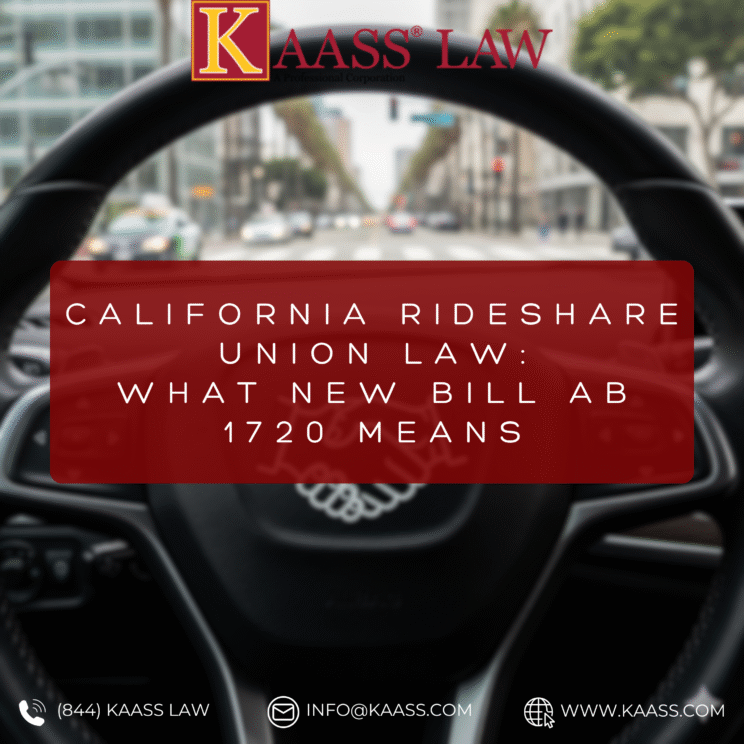In a landmark move, Governor Gavin Newsom recently signed a new bill into law. This bill dramatically reshapes the relationship between rideshare companies and their drivers in California. Specifically, this new law, Assembly Bill 1720, grants app-based drivers new collective bargaining rights. This, in turn, opens the door for them to negotiate over pay and working conditions. This California Rideshare Union Law marks a major new chapter in the state’s long and contentious battle over the legal status of gig workers.
However, the new law does not make drivers employees. Instead, it creates a unique “third way” for independent contractors to have a collective voice. This article will explain what AB 1720 does. Additionally, it will cover how it fits into the history of AB 5 and Prop 22, and what it means for drivers and companies like Uber and Lyft.
The Road to the California Rideshare Union Law
To understand the importance of this new law, we must look at the recent history of gig worker classification in the state.
- Assembly Bill 5 (AB 5): First, in 2019, California passed AB 5. This law established a strict “ABC test.” The test would have reclassified most gig workers, including rideshare drivers, as employees. As employees, they would have been entitled to minimum wage, overtime, and the right to form a traditional union.
- Proposition 22: In response, Uber, Lyft, and other app-based companies spent over $200 million on a 2020 ballot initiative, Proposition 22. California voters passed Prop 22. It created a special exemption for app-based drivers and classified them as independent contractors, not employees. While it provided some new benefits, it explicitly stripped them of the rights that come with employment, including the right to unionize.
What the New California Rideshare Union Law (AB 1720) Actually Does
The new California Rideshare Union Law, AB 1720, is a creative attempt by the legislature to give drivers more power without directly overturning Prop 22. Importantly, it does not reclassify drivers as employees.
Instead, according to the official text of Assembly Bill 1720, the law creates a new framework for “sectoral bargaining.” Here’s what that means in practice:
- Driver Associations: First, drivers can form and join associations that represent their interests.
- Right to Bargain: Then, these associations have the right to meet and negotiate with the rideshare companies on a range of important issues.
- Negotiable Topics: For example, key topics for negotiation include minimum pay standards, health and wellness benefits, and other working conditions.
- State Oversight: Finally, a state-appointed council will oversee the process. This council can help mediate disputes and set industry-wide standards.
Essentially, this law gives independent contractor drivers a collective voice and a seat at the table to negotiate their working conditions.
Impacts of the New Gig Worker Bargaining Law
This new law will undoubtedly have a significant impact on everyone involved in the rideshare industry.
- For Drivers: This is a major victory. For the first time, drivers will have a collective and legally recognized power to negotiate. This can lead to better pay and benefits. It also gives them a way to address common grievances about low wages or arbitrary deactivations.
- For TNCs: Companies like Uber and Lyft will now face a new reality. They can no longer unilaterally set pay rates and policies. Consequently, they will have to engage in formal negotiations with driver associations. This will likely increase their operational costs and change their business model.
Legal Challenges Facing the California Rideshare Union Law
A lawsuit from the TNCs challenging this new law is almost certain. According to news analysis from sources like the Los Angeles Times, Uber and Lyft will likely argue that AB 1720 illegally infringes on the voter-approved framework of Prop 22.
Their argument will be that Prop 22, by defining drivers as independent contractors, implicitly forbids them from having collective bargaining rights. They will claim that the legislature is trying to achieve through AB 1720 what voters rejected when they passed Prop 22. This will, therefore, set up another major legal battle that could ultimately reach the California Supreme Court.
How KAASS LAW Can Help
The new California Rideshare Union Law is a major development in Employment law. It creates a new set of rights for hundreds of thousands of drivers in the state. However, it will also inevitably lead to new and complex legal disputes.
At KAASS LAW, our attorneys stay on top of the latest changes in California employment law. We are dedicated to protecting the rights of workers. This new law will create new challenges for drivers’ associations as they negotiate with powerful TNCs. Furthermore, it will affect individual drivers who may face disputes over their new rights. If you are a rideshare driver and have questions about this new law or other workplace issues, please Contact Us for a confidential consultation.
Conclusion
In summary, the new California Rideshare Union Law is a bold attempt to find a “third way” in the gig economy. It seeks to give independent contractor drivers a powerful collective voice without reclassifying them as traditional employees. While it represents a significant victory for labor advocates and drivers, the law’s future is uncertain. Ultimately, it is destined to face a fierce legal challenge from the rideshare giants. This sets the stage for the next major court battle over the future of gig work in California.

